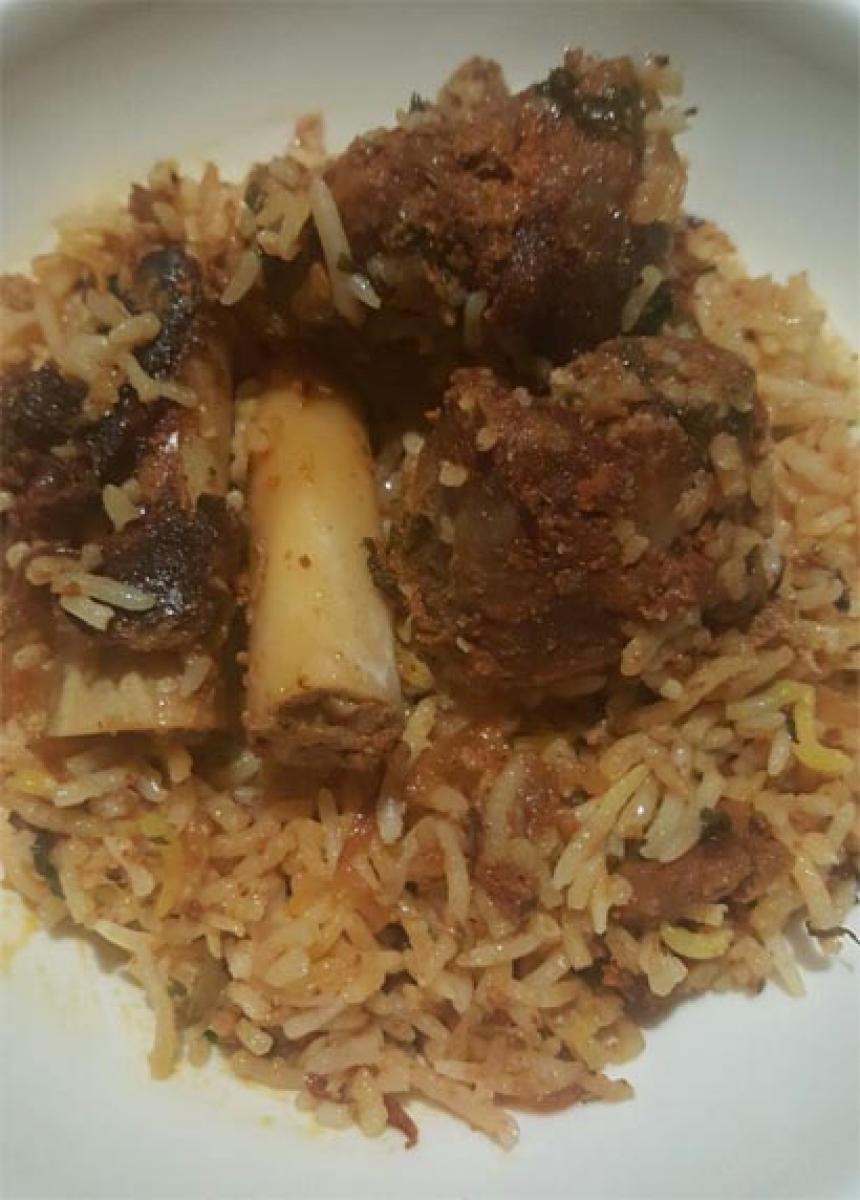Live
- Maha Oppn to boycott customary CM tea meet, cites rising farmers' distress, atrocities against Dalits
- Mikheil Kavelashvili is new Georgian President
- He makes things look easy: Smith on 241-run partnership with Head
- Decline in TB cases & deaths in India ‘remarkable’, shows ‘political commitment’, says former WHO Director
- PKL 11: Delhi dedicates win over Haryana to ‘junior express’
- Cyclone kills 14 in French territory Mayotte
- 3rd Test: Head, Smith centuries flatten India on Day 2
- AAP Announces Final Candidate List For 2025 Delhi Assembly Elections, Kejriwal To Contest From New Delhi
- Bangladesh unrest has delayed execution of some vital projects: Tripura CM
- PIL in SC seeks direction to designate BMC as sole planning, sanctioning authority for Mumbai
Just In
Rich, tangy, spicy Hyderabadi delights await you at Indyaki


Rich, tangy, spicy - these three words best express the uniqueness of The Royal Kitchens of Hyderabad food festival under way at the multi-cuisine Indyaki eatery at the Radisson Blu Hotel in Paschim Vihar.
Rich, tangy, spicy - these three words best express the uniqueness of The Royal Kitchens of Hyderabad food festival under way at the multi-cuisine Indyaki eatery at the Radisson Blu Hotel in Paschim Vihar.
On offer is an amalgamation of Mulghai, Turkish and Arabic food, derived from the princely legacy of the erstwhile nizams of Hyderabad state and is curated by Chef S.K. Saibjan, a master of the genre who has been specially brought down here from the southern city for the festival.
"Opened five years ago, Indyaki often comes up with various food festivals round the year to stand out in the midst of stiff competition," Vivek Chandra Joshi, Indyaki's assistant food and beverage manager, told IANS.
"These food festivals from across states ensure good business at the restaurant," he says, adding: "On our way forward we want to explore such fests with the southern cuisines."
"Providing new and authentic recipes from various regions brings us a new clientele base as well as sustains the existing one," said Ranvir, the head chef at Indyaki.
The response to The Royal Kitchens of Hyderabad has so far been very good, Ranvir added.
Elaborating on Hyderabadi dishes, he said the cuisine emphasises the use of ingredients that are carefully chosen and cooked to the right degree of perfection. Among the condiments used in various delicacies are kabab cheen, pathar ke phool, chirounji, rose petals, sandal and pan ki jad.
Nuts, especially almonds, peanuts and cashew nuts, as also copra (dry coconut), have a major presence in the cuisine, Ranvir elaborated.
Sipping an Indyaki Punch - cola, infused with rock salt, and garnished with mint and lemon - actually makes you feel you are being punched and revived. I took a walk around the eatery to study its interiors.
The walls have various pictures showcasing the many cultural entities of Hyderabad city, making for a delightful and serene environment for foodies to savour the lip-smacking delicacies.
Then, it was time to sample the fare. First came the zaituni malai paneer tikka - paneer marinated with yogurt and spices, with the eternal mint chutney. Mutton seekh kebab, tender nizami murgh tikka and the crispy methi malai machi and gobhi65 followed in quick succession.
Surrounded by these gastronomical delights, I actually forgot all the tiredness of the day and worries of tomorrow. Also, a hope glimmered inside me - if the starters were so delicious, what would the main course be like?
Being a little biased towards non-vegetarian food, I quickly went to the counters serving them for the bouffet element of the fest.
Having heard a lot about the Hyderabadi biryani I delved straight into that.
"Kache ghosht ki biryani (lamb biryani) is raw mutton marinated with garam masala, degi mirch, brown onion, coriander powder, mint leaves and ginger garlic paste and kept for four hours and then cooked on slow fire, in the famous dum cooking style," Saibjan explained.
The tanginess of mirch ka salan, the mouthwatering chicken and mutton pickle accompanied the yummy biryani.
I next opted for a dish that was a great favourite of Chef Saibjan.
Haleem - made up of lentils, daliya, and meat - was completely new to me. Yet the very sight of it brought home to me the labour that went into making it.
Chef Saibjan said that haleem is made during Ramadan - the Muslim holy month of fasting - and is cooked on a slow fire for about 4-5 hours.
It is semi-liquid in form and when consumed before daybreak - when the fasting period begins - has the necessary proteins to keep one going for the 10-12 hours one has to remain without food or water.
"You need extra patience to cook haleem," the chef said, adding: "Ithmenaan (patience) is the key and slow-cooking is the hallmark of Hyderabadi cuisine."
Finally, catering to my sweet tooth were double ka meetha, which was, as the name suggests, doubly sweet; mauz ka meetha - bananas slow cooked with milk, sugar, cardamom and saffron; and gil-e-firdosh made up of bottle gourd cooked with thickened milk, sugar and garnished with elaichi and chopped dried fruit.
In a nutshell, the festival, which is on till February 22, is a must try if you want to indulge in a royal affair and for a mouthwatering experience at the Indyaki.
FAQs:
What: The Royal Kitchens of Hyderabad food festival
Where: Indyaki at Radisson Blu Hotel in Paschim Vihar
Timings: On till February 22, 7.30 p.m to 11.30 p.m
Price: Rs. 1599 per person (without alcohol)
By Rachel V. Thomas
(Rachel V. Thomas can be contacted at [email protected])

© 2024 Hyderabad Media House Limited/The Hans India. All rights reserved. Powered by hocalwire.com






